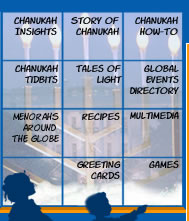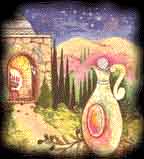 More than 2000
years ago there was a time when the land of Israel
was part of the Syrian Empire, dominated by Syrian
rulers of the dynasty of the Seleucids.
More than 2000
years ago there was a time when the land of Israel
was part of the Syrian Empire, dominated by Syrian
rulers of the dynasty of the Seleucids.
In order to relate the story that led up to
Chanukah, we shall start with Antiochus III, the
King of Syria, who reigned from 3538 to 3574
(222-186 B.C.E.). He had waged war with King
Ptolemy of Egypt over the possession of the Land
of Israel. Antiochus III was victorious and the
Land of Israel was annexed to his empire. At the
beginning of his reign he was favorably disposed
toward the Jews and accorded them some privileges.
Later on, however, when he was beaten by the
Romans and compelled to pay heavy taxes, the
burden fell upon the various peoples of his empire
who were forced to furnish the heavy gold that was
required of him by the Romans. When Antiochus
died, his son Seleucus IV took over, and further
oppressed the Jews.
Added to the troubles from the outside were the
grave perils that threatened Judaism from within.
The influence of the Hellenists (people who
accepted idol-worship and the Syrian way of life)
was increasing. Yochanan, the High Priest, foresaw
the danger to Judaism from the penetration of
Syrian-Greek influence into the Holy Land. For, in
contrast to the ideal of outward beauty held by
the Greeks and Syrians, Judaism emphasizes truth
and moral purity, as commanded by G-d in the holy
Torah. The Jewish people could never give up their
faith in G-d and accept the idol-worship of the
Syrians.
Yochanan was therefore opposed to any attempt
on the part of the Jewish Hellenists to introduce
Greek and Syrian customs into the land. The
Hellenists hated him. One of them told the King’s
commissioner that in the treasury of the Temple
there was a great deal of wealth.
The wealth in the treasury consisted of the
contributions of "half a shekel" made by all adult
Jews annually. That was given for the purpose of
the sacrifices on the altar, as well as for fixing
and improving the Temple building. Another part of
the treasury consisted of orphans’ funds which
were deposited for them until they became of age.
Seleucus needed money in order to pay the Romans.
He sent his minister Helyodros to take the money
from the treasury of the Temple. In vain did
Yochanan, the High Priest, beg him not to do it.
Helyodros did not listen and entered the gate of
the Temple. But suddenly, he became pale with
fright. The next moment he fainted and fell to the
ground. After Helyodros came to, he did not dare
enter again.
The
"Madman"
A short time later, Seleucus was killed and his
brother Antiochus IV began to reign over Syria (in
3586 - 174 B.C.E.). He was a tyrant of a rash and
impetuous nature, contemptuous of religion and of
the feelings of others. He was called "Epiphanes,"
meaning "the gods’ beloved." Several of the Syrian
rulers received similar titles. But a historian of
his time, Polebius, gave him the epithet Epimanes
("madman"), a title more suitable to the character
of this harsh and cruel king.
Desiring to unify his kingdom through the
medium of a common religion and culture, Antiochus
tried to root out the individualism of the Jews by
suppressing all the Jewish Laws. He removed the
righteous High Priest, Yochanan, from the Temple
in Jerusalem, and in his place installed
Yochanan’s brother Joshua, who loved to call
himself by the Greek name of Jason. For he was a
member of the Hellenist party, and he used his
high office to spread more and more of the Greek
customs among the priesthood.
Joshua or Jason was later replaced by another
man, Menelaus, who had promised the king that he
would bring in more money than Jason did. When
Yochanan, the former High Priest, protested
against the spread of the Hellenists’ influence in
the Holy Temple, the ruling High Priest hired
murderers to assassinate him.
Antiochus was at that time engaged in a
successful war against Egypt. But messengers from
Rome arrived and commanded him to stop the war,
and he had to yield. Meanwhile, in Jerusalem, a
rumor spread that a serious accident, had befallen
Antiochus. Thinking that he was dead, the people
rebelled against Menelaus. The treacherous High
Priest fled together with his friends.
The
Martyrs
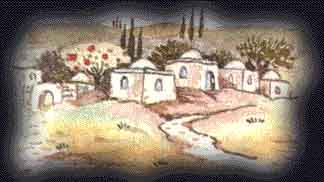 Antiochus returned
from Egypt enraged by Roman interference with his
ambitions. When he heard what had taken place in
Jerusalem, he ordered his army to fall upon the
Jews. Thousands of Jews were killed. Antiochus
then enacted a series of harsh decrees against the
Jews. Jewish worship was forbidden; the scrolls of
the Law were confiscated and burned. Sabbath rest,
circumcision and the dietary laws were prohibited
under penalty of death. Even one of the respected
elders of that generation, Rabbi Eliezer, a man of
90, was ordered by the servants of Antiochus to
eat pork so that others would do the same. When he
refused they suggested to him that he pick up the
meat to his lips to appear to be eating. But Rabbi
Eliezer refused to do even that and was put to
death.
Antiochus returned
from Egypt enraged by Roman interference with his
ambitions. When he heard what had taken place in
Jerusalem, he ordered his army to fall upon the
Jews. Thousands of Jews were killed. Antiochus
then enacted a series of harsh decrees against the
Jews. Jewish worship was forbidden; the scrolls of
the Law were confiscated and burned. Sabbath rest,
circumcision and the dietary laws were prohibited
under penalty of death. Even one of the respected
elders of that generation, Rabbi Eliezer, a man of
90, was ordered by the servants of Antiochus to
eat pork so that others would do the same. When he
refused they suggested to him that he pick up the
meat to his lips to appear to be eating. But Rabbi
Eliezer refused to do even that and was put to
death.
There were thousands of others who likewise
sacrificed their lives. The famous story of Hannah
and her seven children happened at that time.
Antiochus’s men went from town to town and from
village to village to force the inhabitants to
worship pagan gods. Only one refuge area remained
and that was the hills of Judea with their caves.
But even there did the Syrians pursue the faithful
Jews, and many a Jew died a martyr’s death.
Mattityahu
One day the henchmen of Antiochus arrived in
the village of Modin where Mattityahu, the old
priest, lived. The Syrian officer built an altar
in the marketplace of the village and demanded
that Mattityahu offer sacrifices to the Greek
gods. Mattityahu replied, "I, my sons and my
brothers are determined to remain loyal to the
covenant which our G-d made with our
ancestors!"
Thereupon, a Hellenistic Jew approached the
altar to offer a sacrifice. Mattityahu grabbed his
sword and killed him, and his sons and friends
fell upon the Syrian officers and men. They killed
many of them and chased the rest away. They then
destroyed the altar.
Mattityahu knew that Antiochus would be enraged
when he heard what had happened. He would
certainly send an expedition to punish him and his
followers. Mattityahu, therefore, left the village
of Modin and fled together with his sons and
friends to the hills of Judea.
All loyal and courageous Jews joined them. They
formed legions and from time to time they left
their hiding places to fall upon enemy detachments
and outposts, and to destroy the pagan altars that
were built by order of Antiochus.
The
Maccabees
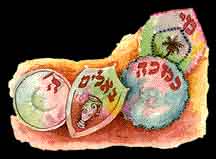 Before his death,
Mattityahu called his sons together and urged them
to continue to fight in defense of G d’s Torah. He
asked them to follow the counsel of their brother
Shimon the Wise. In waging warfare, he said, their
leader should be Yehuda the Strong. Yehuda was
called "Maccabee," a word composed of the initial
letters of the four Hebrew words Mi Komocho
Bo’eilim Hashem, "Who is like unto Thee, O
G-d."
Before his death,
Mattityahu called his sons together and urged them
to continue to fight in defense of G d’s Torah. He
asked them to follow the counsel of their brother
Shimon the Wise. In waging warfare, he said, their
leader should be Yehuda the Strong. Yehuda was
called "Maccabee," a word composed of the initial
letters of the four Hebrew words Mi Komocho
Bo’eilim Hashem, "Who is like unto Thee, O
G-d."
Antiochus sent his General Apolonius to wipe
out Yehuda and his followers, the Maccabees.
Though greater in number and equipment than their
adversaries, the Syrians were defeated by the
Maccabees. Antiochus sent out another expedition
which also was defeated. He realized that only by
sending a powerful army could he hope to defeat
Yehuda and his brave fighting men.
An army consisting of more than 40,000 men
swept the land under the leadership of two
commanders, Nicanor and Gorgiash. When Yehuda and
his brothers heard of that, they exclaimed: "Let
us fight unto death in defense of our souls and
our Temple!" The people assembled in Mitzpah,
where Samuel, the prophet of old, had offered
prayers to G-d. After a series of battles the war
was won.
The
Dedication
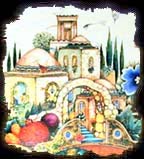 Now the Maccabees
returned to Jerusalem to liberate it. They entered
the Temple and cleared it of the idols placed
there by the Syrian vandals. Yehuda and his
followers built a new altar, which he dedicated on
the twenty-fifth of the month of Kislev, in the
year 3622.
Now the Maccabees
returned to Jerusalem to liberate it. They entered
the Temple and cleared it of the idols placed
there by the Syrian vandals. Yehuda and his
followers built a new altar, which he dedicated on
the twenty-fifth of the month of Kislev, in the
year 3622.
Since the golden Menorah had been stolen by the
Syrians, the Maccabees now made one of cheaper
metal. When they wanted to light it, they found
only a small cruse of pure olive oil bearing the
seal of the High Priest Yochanan. It was
sufficient to light only for one day. By a miracle
of G-d, it continued to burn for eight days, till
new oil was made available. That miracle proved
that G-d had again taken His people under His
protection. In memory of this, our sages appointed
these eight days for annual thanksgiving and for
lighting candles.
